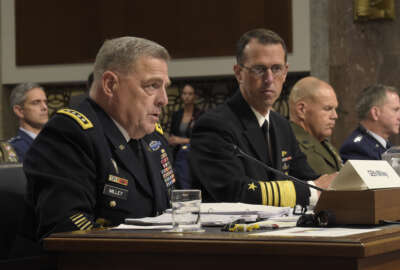Fiscal 2017 begins in 11 days, and while threats of a shutdown have yet to emerge, Congress’ unofficial tradition of eleventh-hour negotiations on how to fund the government are spurring discussion on budget reform.
Sen. Mike Enzi (R-Wy.), chairman of the Senate Budget Committee, warned during a Sept. 19 Committee for a Responsible Federal Budget event that Congress is like a binge eater ready to diet right after dessert — or in the case of Capitol Hill, the next budget cycle.
“We’re going to have an omnibus this year. That means that a couple of people are going to sit down in a room and figure out what all the great expenditures are for this country,” Enzi said. “I just got a report that the overspending for this year is now projected to be $590 billion. How significant is that? I told you we only get to make decisions on ‘$1,070 billion,’ so that’s a pretty gross overspending. Of course it isn’t all out of the discretionary funds. The other funds go up too, even though they’re mandatory. But when they go up, we have to take the money out of the discretionary money, so there’s less and less to work with for defense and highways and education, the other things we do.”
The Senate is scheduled to vote Tuesday afternoon on a House bill that will be used as foundation for a short-term CR. The vote was scheduled for Monday, but weekend negotiations on earmarks such as funding to combat Zika virus didn’t get far, the Associated Press reported.
“I’m encouraged by the headway we’ve made,” said Senate Minority Leader Harry Reid (D-Nev.), according to AP. “There’s still work to be done.”
Once the Senate passes a CR, House Minority leadership will encourage House Republicans to take it up as soon as possible, a Democratic leadership aide told Federal News Radio.
Office of Management and Budget Director Shaun Donovan said earlier this month that he was “disappointed” to see Congress fall to the same gridlock that it did last year.
That disappointment, as well as the need to restore faith in the budgeting process — not to mention fund the government — have prompted numerous hearings and now recommendations from the Senate budget committee on how to reform the budget process.
“There are solutions and we’ve been working on those as a committee in a bipartisan way,” Enzi said.
Among those solutions was the suggestion “let’s put everything on the budget that doesn’t have a source of revenue sufficient to cover the expenses each and every year,” Enzi said. “What I did was just put everything on the budget, because none of them have the dollars to sustain themselves out of the revenue that’s been dedicated to them.”
Enzi said there is also support to eliminate “vote-a-rama,” which is the process when amendments for a bill can be turned in at the last minute. They often turn into an “ambush approach” or a way to make a political point, Enzi said, that don’t have a real connection to whether spending should be increased or decreased for something.
Enzi’s other suggestions include setting aside two or three months of mandatory floor time for appropriations, moving to a biennial budget cycle, and establishing a new budget commission.
Sens. Mark Warner and Tim Kaine, both Virginia Democrats who also sit on Enzi’s committee, supported the requirement of a two-year budget cycle.
The panel of accounting and budget experts who also spoke at the event generally agreed with the senator’s views that budget reform is needed, but they also offered their own amendments to the congressman’s recommendations.
Charles Konigsberg, a principal with the Federal Budget Group, said a biennial budget does have its merits, but some could argue the annual appropriations process has “the most effective oversight ever done over federal programs.”
Konigsberg also suggested instead of giving dedicated floor time for appropriation bills, “maybe we ought to consider ending filibusters on appropriations bills … and also making non-germane policy riders a violation of Senate rules.”
Ed Lorenzen, a senior advisor for the Committee for a Responsible Federal Budget, said when it comes to budget policy and enforcement mechanisms, it was key to make sure the mechanism was one “that’s harsh enough that both sides want to avoid it.”
“Sequestration was supposed to force Congress to make policy choices to reduce the deficit,” Lorenzen said. “The existence of sequestration then forced Congress to enact policy changes to achieve savings. The biggest lesson is the need for an enforcement mechanism to be broad based.The enforcement mechanism for the Budget Control Act was almost entirely focused on discretionary spending.”
Lorenzen said Congress has gotten to a point where some are willing to let sequestration take effect, which is why that enforcement mechanism needs to be tough.
“That’s why I suggest maybe even have an enforcement mechanism achieve more savings than are required to meet the goal, but alternatively, maybe the approach of a carrot would work better,” he said. “Trying to avoid the need to raise the debt limit if you’re beating goals, that could also work.”
Enzi said the hope was to get these reforms in place before the election, because major changes are likely under the new administration.
“That doesn’t work very well, you have to have both sides committed to these things, particularly the budget, because times change,” Enzi said. “We need some honest accounting, we need more detailed accounting, we need some more timely accounting, and I think we’re on a path to maybe getting that done.”
Copyright
© 2024 Federal News Network. All rights reserved. This website is not intended for users located within the European Economic Area.
